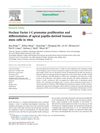Search
for
Sort by
Research
480-510 / 1000+ results
research Natural Product Shi-Bi-Man Regulates Lactic Acid Metabolism and Drives Hair Follicle Stem Cell Activation to Promote Hair Regeneration
Shi-Bi-Man activates hair follicle stem cells and promotes hair growth by changing lactic acid metabolism and other cellular processes.

research Nuclear Factor I-C Promotes Proliferation and Differentiation of Apical Papilla-Derived Human Stem Cells In Vitro
NFIC helps human dental stem cells grow and become tooth-like cells.

research Plumbagin, A Natural Compound With Several Biological Effects And Anti-Inflammatory Properties
Plumbagin may help protect cells, reduce inflammation, and has potential for treating various diseases, but more research is needed.

research Immunohistochemical Study of Hair Follicle Stem Cells in Regenerated Hair Follicles Induced by Wnt10b
Increasing Wnt10b levels can help grow new hair follicles in mice.

research Research Progress on Targeted Regulation of Hair Follicle Stem Cell Function in the Treatment of Androgenetic Alopecia
New treatments using stem cells and other methods show promise for promoting hair growth in androgenetic alopecia.

research Pharmacology of Natural Volatiles and Essential Oils in Food, Therapy, and Disease Prophylaxis
Natural volatiles and essential oils have health benefits and can enhance the effects of some medicines, but more research is needed to understand how they work and their possible side effects.

research Intrinsic and Extrinsic Factors Associated with Hair Graying and Therapeutic Potential of Plant Extracts and Phytochemicals
Plant extracts may help prevent or reverse hair graying.

research Scarring Hair Follicle Destruction Is Driven by the Collapse of EGFR-Protected JAK-STAT1-Sensitive Stem Cell Immune Privilege
A protein called EGFR protects hair follicle stem cells, and when it's disrupted, hair follicles can be damaged, but blocking certain pathways can restore hair growth.

research Mesotherapy and Platelet-Rich Plasma for the Treatment of Hair Loss
Mesotherapy and platelet-rich plasma treatments may help with hair loss, but their safety and effectiveness are still uncertain.

research Advances in Genetic and Molecular Understanding of Omenn Syndrome: Implications for the Future
Newborn screening and gene therapy are expected to improve outcomes for Omenn syndrome patients.

research Exosomes as a Novel Pathway for Regulating Development and Diseases of the Skin
Exosomes are important for skin health and could help diagnose and treat skin diseases.

research The Topography of Fibrous Scaffolds Modulates the Paracrine Function of Adipose-Derived Mesenchymal Stem Cells in the Regeneration of Skin Tissues
The shape of fibrous scaffolds can improve how stem cells help heal skin.
research Human iPS Cell-Derived Cell Aggregates Exhibited Dermal Papilla Cell Properties in In Vitro Three-Dimensional Assemblage Mimicking Hair Follicle Structures
Scientists made structures that look like human hair follicles using stem cells, which could help grow hair without using actual human tissue.

research Functional Salivary Gland Regeneration by Transplantation of a Bioengineered Organ Germ
Scientists made working salivary glands in mice using bioengineered cells, which could help treat dry mouth.

research The Regeneration Blastema of Lizards: An Amniote Model for the Study of Appendage Replacement
Lizards can regrow their tails, and studying this process helps understand scar-free healing and limb regeneration.

research Gelatin-Chondroitin-6-Sulfate-Hyaluronic Acid Scaffold Seeded with Vascular Endothelial Growth Factor 165 Modified Hair Follicle Stem Cells as a Three-Dimensional Skin Substitute
Modified rat stem cells on a special scaffold improved blood vessel formation and wound healing in skin substitutes.

research Culture of Pyramidal Neural Precursors, Neural Stem Cells, and Fibroblasts on Various Biomaterials
Different materials affect the growth of brain cells and fibroblasts, with matrigel being best for brain cell growth.

research Identification of Stem Cell Populations in Sweat Glands and Ducts Reveals Roles in Homeostasis and Wound Repair
The study found that sweat glands contain different types of stem cells that help with healing and maintaining healthy skin.

research Stem Cell-Derived Motor Neurons from Spinal and Bulbar Muscular Atrophy Patients
The study suggests that motor neurons created from stem cells of patients with spinal and bulbar muscular atrophy show signs of the disease, including changes in protein levels and cell functions.

research Mechanical Stretch Upregulates SDF-1α in Skin Tissue and Induces Migration of Circulating Bone Marrow-Derived Stem Cells into the Expanded Skin
Stretching skin increases a certain protein that attracts stem cells, helping skin regeneration.

research Application of Mesenchymal Stem Cells Derived from Bone Marrow and Umbilical Cord in Human Hair Multiplication
Bone marrow and umbilical cord stem cells can help grow new hair.

research Effect of Poly(3-Hydroxybutyrate-Co-3-Hydroxyvalerate) Nanofiber Matrices Cocultured With Hair Follicular Epithelial and Dermal Cells for Biological Wound Dressing
PHBV nanofiber matrices help wounds heal faster when used with hair follicle cells.

research Fat, Stem Cells, and Platelet-Rich Plasma
The conclusion is that fat grafting is safe and effective but carries risks that need careful management.

research Pre-Aggregation of Scalp Progenitor Dermal and Epidermal Stem Cells Activates the WNT Pathway and Promotes Hair Follicle Formation In Vitro and In Vivo Systems
Grouping certain skin cells together activates a growth pathway that helps create new hair follicles.

research Exosomal MicroRNAs Derived from Dermal Papilla Cells Mediate Hair Follicle Stem Cell Proliferation and Differentiation
Exosomes from dermal papilla cells help hair growth by making hair follicle stem cells multiply and change.

research Effects of Porcine Acellular Dermal Matrix Treatment on Wound Healing and Scar Formation: Role of Jag1 Expression in Epidermal Stem Cells
Porcine acellular dermal matrix treatment helps wounds heal faster and reduces scarring by affecting Jag1 in skin stem cells.
research Human Wharton’s Jelly Mesenchymal Stem Cells Plasticity Augments Scar-Free Skin Wound Healing with Hair Growth
Wharton’s Jelly stem cells from the umbilical cord improve skin healing and hair growth without scarring.

research Signaling Couples Hair Follicle Stem Cell Quiescence With Reduced Histone H3 K4/K9/K27me3 for Proper Tissue Homeostasis
Certain signals are important for reducing specific chemical markers on hair follicle stem cells during rest periods, which is necessary for healthy hair growth.

research Hair Follicle-Derived Mesenchymal Stem Cells Decrease Alopecia Areata Mouse Hair Loss and Reduce Inflammation Around the Hair Follicle
Hair follicle stem cells reduced hair loss and inflammation in mice with a condition similar to human alopecia.